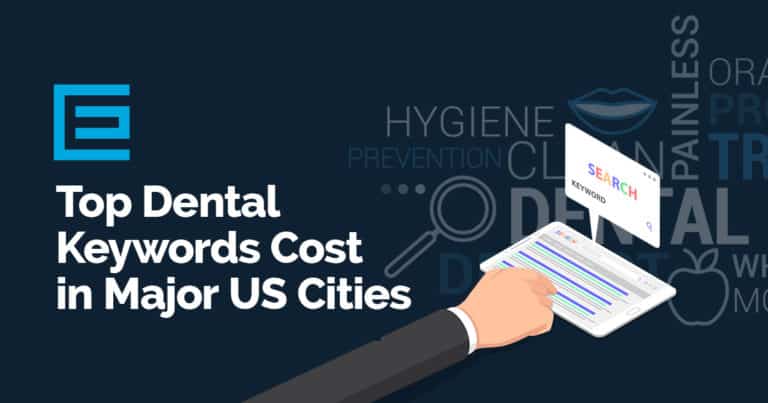Dental Website Optimization Best Practices
Site Load Speed
As more internet users move from desktops and laptop computers on to mobile and tablets, it becomes increasingly important that you make sure that your website is optimized for fast load times. According to a study done by Amazon, a 1-second increase in page load times lost them 1.6 billion dollars in business. This pattern is repeated across the web, and having a slow website will lose you potential customers. You might not be Amazon and your losses won’t be that steep, but you will lose customers if your site takes too long for them to load. Therefore, the single best thing you can do is make sure that at least your homepage is well-optimized for fast load times. The easiest way to do this is to go to Google’s PageSpeed Insights Tool and follow their recommendations there.Correct Keywords for a Dental Website
Most dentists realize that their practices are local businesses almost by their very nature, but many dentists don’t manage to translate this knowledge into optimization. If you are a dentist that primarily does Cosmetic Dentistry, don’t merely optimize your website for “dentist”. Optimize your website for “[town] cosmetic dentist” and “cosmetic dentistry in [town]”. These are called “long-tail” keywords. While they don’t have the same raw search volume as something as basic as “dentist”, they have the advantage of filtering your customers for you, as people who search for “cosmetic dentistry in [town]” are much closer to becoming paying customers. They also have the advantage of not being nearly as competitive as the more basic keywords! Many dentists believe that determining the right keywords to target for their practices is a nearly impossible task, but it is actually simpler than they anticipate. One of the first steps is merely to do a reflection on the services you offer and the locations in which you offer them. If you offer dental implants, Invisalign, veneers, and teeth whitening in towns A and B, you already have 8 keywords for which to optimize. Decide which ones bring in the best business, and work from there to build service pages.Service pages for Dental Website Optimization
Service pages are the best way to optimize your dental website for the keywords you chose in the step above. A service page is a page dedicated entirely to a single service and ideally a single location, such as “dental veneers in [town]”. This guarantees a targeted experience for the end user, as they are finding the exact service for which they were looking. In addition, it means you can spend all of your SEO efforts on a single keyword or set of keywords [service + location]. This is a long-term process because ideally, you would want service pages for every service and location combination, but the important thing is to start with your most important or most valuable keywords and work from there. The actual writing of service pages is a blend of making sure you use your keywords with over-stuffing your content. You must also take into account the fact that the content needs to be friendly for humans to read, as Google is constantly getting better at parsing “natural language”. If you don’t have the time or inclination to do this for yourself, TheeDigital offers service page writing and copywriting for dentists.Link and Citation Building
Due to the nature of the industry, almost all dental offices are essentially local businesses. This means that reinforcing your local rankings can have outsized payouts when it comes to getting patients through your doors. We’ve already written about the best practices in optimizing your Google Business listing here, but local citations with the correct Name, Address, and Place of your business are just as important for your dental website as well. When people search for “cosmetic dentist in [town]”, Google will rank your website higher if they have confidence in your practice’s location in the targeted town. These citations are also often from highly-respected sites, which pass along significant value from their links. Link building is the art of getting sites to send a link to your website, validating it in the eyes of Google and transferring some ranking power (SEOs will often call it “link juice”). People have been preaching the death of link building for more than a decade now, but it is still a large part of making sure that your dental practice website’s optimization is perfectly polished. This is because Google uses links as a measure of a website’s strength and relevance to other users. Therefore, it is crucial that you or your marketing team build links to your website from local directories and especially from dental-specific websites and forums. These dental websites can also serve a dual purpose as Trust Signals.Trust Signals
While Trust Signals are not a direct ranking factor in and of themselves beyond their relevance as sources of links, they are nonetheless important as they let visitors to your site know that you are a trusted source of dental care in your area. These trust signals drive customer engagement and conversion, and Google does take these into account when ranking your site. To use a single example, Google pays attention to the “Bounce Rate” (how many people enter and then leave without taking any actions) of sites when ranking them, and having prominent trust signals will lower your bounce rate as it demonstrates trustworthiness.Blogging for Dentists
Many dentists like to keep an active blog to discuss their thoughts on any happenings in the dental world or thoughts on their practices. The good news is that with very slight tweaks, blogging can be a tool that dentists can keep in their arsenal of website optimization tools. As long as the blogs are related to dentistry and either reflect the expertise of the dentist or be optimized for a particular offering or service. If your dental practice runs a special offer during part of the year or has recently acquired a new tool or service, the perfect place to announce it is in a blog post. In addition, blog posts can be used to humanize the dentists and staff at your practice, showing holiday parties, out-of-office events, charity events, and other non-dentistry events. You can use Social Media in much the same way that you would use a blog post, and in fact, they can work together if you write a blog post and then post it to your social media accounts.Social Media Marketing for Dentists
Social media can be a great SEO tool for dentists, especially if you or one of your staff members has some experience managing social media accounts and a willingness to deal with customers and other local organizations over Facebook or Twitter. While Social Media can be used to promote specific dental news, it is better used to foster a sense of community via interaction. To take the example of the limited-time offer above, posting about it on Facebook and Twitter is a great way to get your offer in front of your community. In addition, it gives you an additional avenue to communicate with your customers about less-serious things such as charity events and smaller promotions.Your Dental Website Optimization Is Your Lifeblood
While this might all sound like a lot of work, it is all worth it in the end. If you have a website that is ranking poorly, then it is going to get very few views and fewer people will convert into paying customers. Making sure that your website is optimized and well-positioned to get visitors to turn into patients is a very smart investment, as your website is working for you 24/7. The steps listed above, however, are not one and done steps. Much like brushing your teeth, you need to do them often to guarantee the health of your website.Feeling overwhelmed thinking about your dental marketing? Looking for an experienced dental web design agency that can create a professional looking website for you that is search engine friendly and easy to manage? Contact our award-winning web designers and dental internet marketing professionals in Raleigh, NC at 919-341-8901 or schedule a complimentary consultation and website review.
Tags: Dental Marketing • Digital Marketing • Inbound Marketing • Search Engine Optimization



